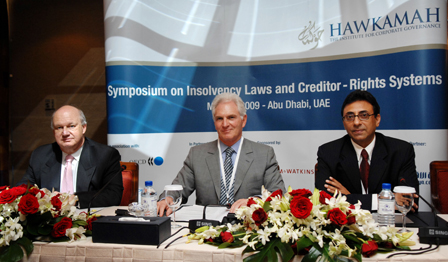
The Hawkamah Institute for Corporate Governance today announced the results of its pioneering benchmark survey of insolvency regimes of countries in the Middle East and North Africa region.
In the survey that measured the quality and development of insolvency systems, the MENA region scored an average of 88 points compared to 124 scored by OECD countries in a recent survey that applied the same scoring system. In the survey’s other findings, DIFC was ranked number one in an assessment of the insolvency systems of regional organisations, scoring 126 points out of a maximum of 155.
Based on the methodology of a joint IMF-World Bank pilot exercise titled “Reports of the Observance of Standards and Codes” (ROSCs), the Hawkamah survey featured a questionnaire that covered the diverse aspects of an insolvency regime including, Legal Framework for Creditors Rights; Risk Management and Corporate Workout; Legal Framework for Insolvency and Reorganisations; and Proceedings and Implementation of the Insolvency System.
The survey was undertaken by Hawkamah jointly with the World Bank, INSOL International and the Organisation for Economic Cooperation and Development (OECD) in close collaboration and cooperation with authorities, lawyers and legal professionals in the region.The eleven jurisdictions included in the survey were the UAE, Lebanon, Egypt, Jordan, KSA, Bahrain, Qatar, Oman, Yemen, and Palestine, as well as the Insolvency Law of the Dubai International Financial Centre (DIFC).
Speaking about the regional findings, Dr. Nasser Saidi, Chief Economist of the DIFC Authority said that while the results are satisfactory insolvency regimes need to be strengthened to help countries in the region manage current and future challenges. The survey revealed that GCC countries have strong insolvency systems in all but four areas: regulatory considerations (practitioners), institutional considerations (judicial), corporate governance and credit information systems.
The survey results were released at Hawkamah’s first Symposium on Insolvency Laws and Creditor Rights Systems in the MENA region, being held on 26 and 27 May at the Abu Dhabi Hilton Hotel. Government policymakers and regulators, judges and lawyers, restructuring and insolvency professionals, bankers and accountants, auditors and financial forensic experts from the MENA region are attending the two-day event. Key figures participating in the Symposium include HE Mahmoud Mohieldine, Minister of Investment in Egypt; Mahesh Uttamchandani, Senior Counsel at the World Bank; Dr Rainer Geiger, Senior Regional Advisor OECD; Robert Sanderson, President of INSOL International and Sumant Batra, Vice President, INSOL International.
Emphasising the critical importance of effective insolvency systems in the region, Dr. Saidi said at the Symposium: “The MENA region is going through a financial crisis that it had no role in instigating. Under these circumstances, it is more important than ever to study insolvency laws and creditors’ rights in the region. The importance of these laws is that they help mitigate the repercussions of the financial crisis by outlining specific procedures to deal with insolvency or defaulting cases and the possibility of restructuring or even rescuing them when feasible.”
Discussing the objectives of the survey, Dr Saidi said its purpose was not limited to improving ways of dealing with the financial crisis but includes procedures that help limit its future effects that may extend to many years. The results of the survey reinforce the need for putting in place strong legal foundations for carrying out insolvency proceedings and guaranteeing creditors’ rights, he said.
HE Dr Mahmoud Mohieldine, Egyptian Minister of Investments said in his speech that MENA countries focus more on establishing, licensing and entry processes rather than exits. He explained that exit processes are not limited to cases of insolvency but also apply to mergers and acquisitions (M&As). Dr Mohieldine stressed on the need for focusing on small and medium enterprises (SMEs), particularly in emerging markets. Good insolvency systems provide a clear process for the liquidation or distribution of assets for SMEs facing insolvency, he said.
Mahesh Uttamchandani of World Bank said that having an effective legal and regulatory framework helps mitigate the negative implications for all stakeholders in cases of insolvency or default. He explained that having clear and strong insolvency systems can help minimise the influences of the financial crisis by allocating risk in a predictable, equitable, and transparent way, thereby bolstering confidence in the credit system, maximising value through continuation of a viable enterprise and enabling financial institutions to curtail deterioration of assets by providing a means of enforcing claims. He also explained that lacking good insolvency systems makes banks more reluctant to lend, leading to slower economic growth.
Participants in the Hawkamah Symposium will issue the “Hawkamah Declaration on Insolvency Systems” on the second day of the event to outline steps for improving insolvency frameworks and processes.
Hawkamah Announces Findings of Pioneering Survey of Insolvency Systems and Creditors Regimes in MENA
26 May, 2009
read 3 minutes
Read Next
Media Comments & Quotes
Comments on CSR, Global Post via Xinhua, 19 May 2015
Click here to access the original article, published 19 May 2015; comments highlighted below. Corporate social responsibility
20 May, 2015
MENA Economics
Ethics, Rebuilding Trust in Finance & Some Lessons from Islamic Finance: Speech at EFICA 2014
This keynote address was given at Ethical Finance Innovation Challenges & Awards (EFICA) 2014, organised
30 October, 2014
Media Comments & Quotes
Regulators may be the “new rock stars” but don’t forget the media: The National
[This article by Frank Kane appeared in The National on 18th Feb, 2014. Link to
19 February, 2014



